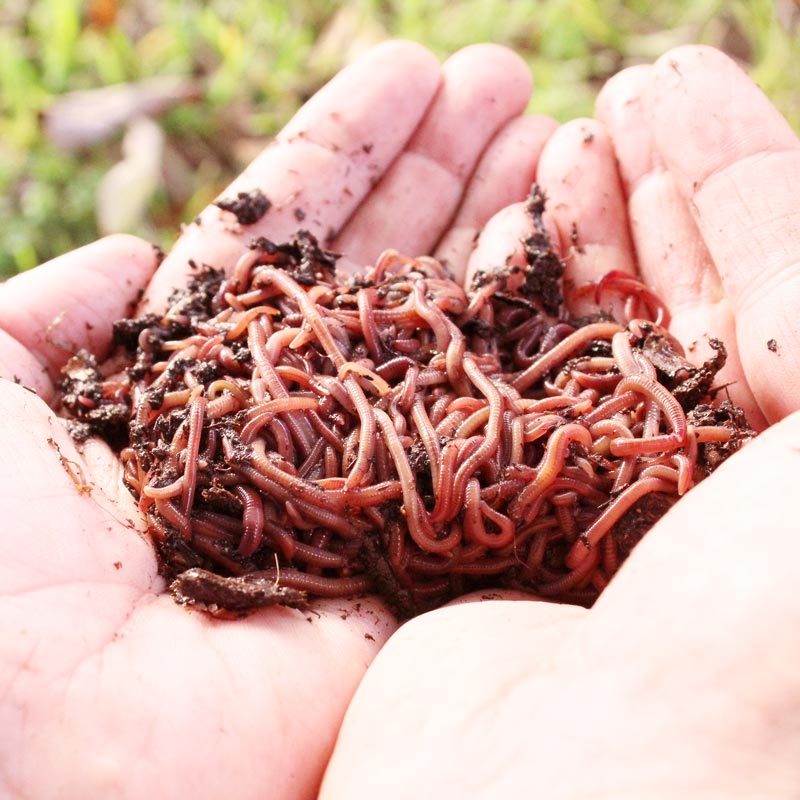Acquire Red Wiggler Worms Online - Hassle-free and Fast Shipping
Acquire Red Wiggler Worms Online - Hassle-free and Fast Shipping
Blog Article
Red Wiggler Worms Demystified: Opening the Tricks of Vermiculture for Greener Living and Nutrient-Rich Soil
In the realm of sustainable methods for improving soil quality and promoting eco-conscious living, red wiggler worms play a pivotal yet typically overlooked role. These simple animals have the remarkable ability to transform natural waste right into nutrient-rich spreadings that act as a potent natural plant food. By diving into the world of vermiculture, one can discover a wide variety of advantages that extend far past traditional composting approaches. Recognizing the ins and outs of caring for these worms, enhancing their setting, and utilizing their castings can lead to a greener way of living and healthier dirt for plants to prosper.
The Duty of Red Wiggler Worms
Red Wiggler worms play an essential function in composting systems by efficiently breaking down natural matter right into nutrient-rich spreadings. These ravenous eaters take in a variety of natural products, such as cooking area scraps, backyard waste, and paper products. As they feed, the worms' digestive procedures break down the raw material into a penalty, dark, and nutrient-dense material called worm spreadings or vermicompost.
The castings produced by Red Wiggler worms are very valuable for dirt health and plant development. They are rich in vital nutrients like nitrogen, potassium, and phosphorus, which are vital for sustaining healthy and balanced plant growth. In addition, worm spreadings include helpful germs and enzymes that help boost soil framework, increase water retention, and improve nutrient uptake by plants.
Benefits of Vermicomposting

It boosts dirt structure, enhances soil aeration, and raises dirt moisture retention. Vermicompost additionally enhances the soil with important nutrients like phosphorus, potassium, and nitrogen, promoting plant development and total dirt fertility.
In addition, vermicomposting supports sustainable horticulture methods by providing a chemical-free and all-natural choice to synthetic fertilizers. Red Wiggler Worms. This eco-friendly approach not only enhances the soil yet additionally helps in reducing dependence on harmful chemicals, promoting a greener and a lot more lasting way of gardening
Establishing a Worm Bin
When developing a worm container for vermicomposting, proper setup is vital to ensure the success of the composting process. The very first step in establishing a worm container is choosing a suitable container. This can be a plastic container or wooden box that supplies sufficient room for the worms to walk around and has appropriate water drainage openings to avoid waterlogging. Next, a bed linens product such as shredded newspaper, find out here cardboard, or coconut coir must be contributed to the bin. This bed linens provides a comfortable environment for the worms and helps maintain moisture degrees.
After adding the bedding, present the red wiggler worms to the bin. The worms need to then be provided with food scraps such as fruit and veggie peels, coffee premises, and eggshells.
Routinely monitor the moisture levels and temperature level in the worm container to ensure optimum conditions for the worms. With appropriate setup and upkeep, the worm bin will effectively convert natural waste into nutrient-rich compost for your plants and garden.
Collecting Worm Castings
To successfully collect nutrient-rich worm castings from your vermicomposting system, a methodical harvesting technique is essential. When it comes time to harvest the worm castings, there are a couple of key steps to comply with to guarantee an effective procedure.

Troubleshooting Common Issues
Determining and attending to common difficulties that may arise during the vermicomposting procedure is vital for maintaining a efficient and healthy and balanced worm bin. One typical concern that vermicomposters encounter is overfeeding. Including excess food scraps can lead to an accumulation of moisture and acidity in the worm container, possibly harming the worms. To stop this, feed the worms in moderation, making sure that the food scraps are effectively broken down before including more. One more concern is unpleasant odors rising from the worm container. Foul smells indicate anaerobic problems, generally brought on by overwatering or poor ventilation. To fix this, readjust the dampness degrees by adding dry bed linen products like shredded paper or cardboard and boost oygenation by turning the bed linen routinely.
Furthermore, if the worm populace is decreasing or the worms appear undesirable, it can be due to environmental stressors such as extreme temperatures or pH levels. Checking these variables and making required modifications is vital for the health of the worms. By troubleshooting these common problems without delay, vermicomposters can ensure a successful and smooth vermicomposting process while maintaining a thriving worm populace.

Final Thought
In final thought, red wiggler worms play an essential function in vermiculture by breaking down organic matter into nutrient-rich dirt. Establishing up a worm container is important for successful vermiculture, and gathering worm spreadings gives beneficial compost for gardening.
As they feed, the worms' digestion procedures break down the organic matter why not try these out into a fine, dark, and nutrient-dense material understood as worm spreadings or vermicompost.
The spreadings created by Red Wiggler worms are extremely beneficial for soil wellness and plant development. Adding excess food scraps can lead to an accumulation of dampness and level of acidity in the worm container, possibly damaging the worms.In addition, if the worm populace is declining or the worms appear harmful, it can be due to ecological stress factors such as severe temperature levels or pH degrees. Setting up a worm container is crucial for effective vermiculture, and collecting worm spreadings supplies valuable compost for gardening.
Report this page